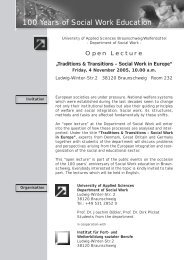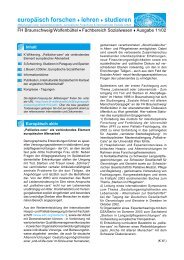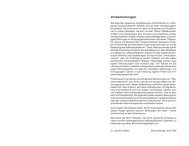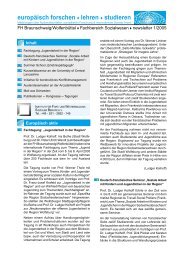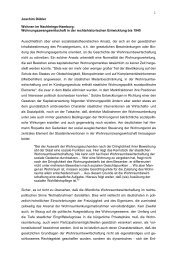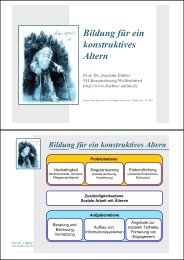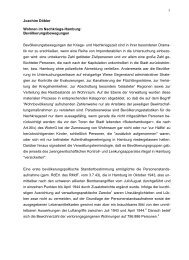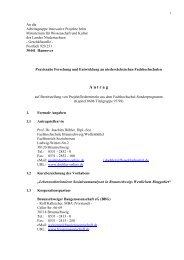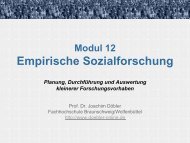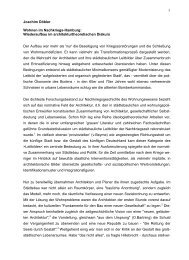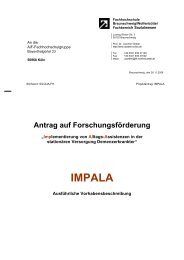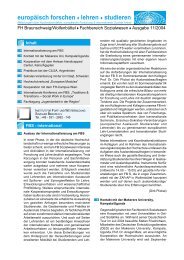CONTRIBUTIONS TO THE BOLOGNA PROCESS - Doebler-online.de
CONTRIBUTIONS TO THE BOLOGNA PROCESS - Doebler-online.de
CONTRIBUTIONS TO THE BOLOGNA PROCESS - Doebler-online.de
Create successful ePaper yourself
Turn your PDF publications into a flip-book with our unique Google optimized e-Paper software.
13Seventh consi<strong>de</strong>ration: more emphasis should be put on assessing learning outcomesand competenciesThe <strong>de</strong>velopments outlined in the fourth, fifth and sixth consi<strong>de</strong>rations all lead in thedirection of putting more emphasis on assessing learning outcomes and competenciesrather than the way in which qualifications have been earned. This is not to say that thisaspect is absent today. In fact, there have already been encouraging <strong>de</strong>velopments in thisdirection. For example, work is un<strong>de</strong>r way in the Netherlands (e.g. through the ACCEPTproject of NUFFIC, the Dutch ENIC/NARIC), Swe<strong>de</strong>n and the United Kingdom. TheEuropean Language Portfolio, <strong>de</strong>veloped by the Council of Europe’s Mo<strong>de</strong>rn LanguagesDivision, provi<strong>de</strong> a framework for the <strong>de</strong>scription of foreign language skills. Futureversions of the ECTS are also likely to emphasize learning outcomes more strongly.However, this <strong>de</strong>velopment will need to be taken further. Learning outcomes <strong>de</strong>scribethe more or less traditional objectives of the curriculum or the educational process,whereas competencies <strong>de</strong>scribe the actual skills and abilities of the person concerned,in<strong>de</strong>pen<strong>de</strong>ntly of whether these have been acquired through formal educationprogrammes, informal learning or even work experience. Methods and procedures mustbe <strong>de</strong>veloped that allow learning outcomes and competencies to be <strong>de</strong>scribed andcompared. The past and current emphasis on length of study is in part explained by thefact that length of study (especially when expressed as years of study, which is not theonly measure of time) is seen as an easily quantifiable and un<strong>de</strong>rstandable indication ofworkload. It is not i<strong>de</strong>al, and objections have been raised, but it still seems reasonablywell accepted, also by those whose applications for recognition are not fully accepted. Ifwe are to move further toward a direct assessment of learning outcomes andcompetencies, alternative standards will have to be <strong>de</strong>veloped.Suggested action(i)(ii)national authorities and higher education institutions should review theway in which higher education programmes and qualifications are<strong>de</strong>scribed in or<strong>de</strong>r to ensure that these give an a<strong>de</strong>quate <strong>de</strong>scription of thecompetencies conveyed by the programme;the ENIC and NARIC Networks, in cooperation with national qualityassurance agencies, should <strong>de</strong>velop international standards for theassessment and recognition of competencies, as well as ways in whicha<strong>de</strong>quate information may be provi<strong>de</strong>d in this area.Eighth consi<strong>de</strong>ration: the link between recognition and qualityassessment/accreditation should be strengthened.This is a logical consequence of diversification. With a wi<strong>de</strong> choice of higher educationprovisions, much of it beyond the confines of traditional state provision, the need to



